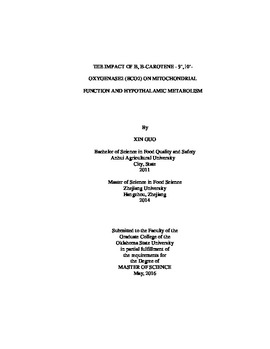| dc.contributor.advisor | Lin, Dingbo | |
| dc.contributor.author | Guo, Xin Guo | |
| dc.date.accessioned | 2018-06-25T16:31:18Z | |
| dc.date.available | 2018-06-25T16:31:18Z | |
| dc.date.issued | 2016-05-01 | |
| dc.identifier.uri | https://hdl.handle.net/11244/300297 | |
| dc.description.abstract | B,B-carotene-9’,10’-oxygenase2 (BCO2) is a carotenoid cleavage enzyme localized to the inner membrane of mitochondria. Hypothalamus is the key brain region that regulates energy homeostasis through nutrient sensing and signal integration from central and peripheral pathways. The aim of this study is to explore the impact of BCO2 on maintaining mitochondrial function and hypothalamic metabolism, as well as the mechanism of why BCO2 -/- mice exhibit orexigenic phenotype. Using 129S6 wild type (WT) and BCO2 -/- mice model, we measured metabolic profiling differences in hypothalamus caused by the deletion of the BCO2 gene. Mitochondrial proteomic and functional analyses were also conducted to evaluate the impact of BCO2 on mitochondria. Metabolomics results revealed striking metabolic changes between genotypes. The top ranking metabolites in distinguishing WT and BCO2-/- mice suggested key differences in transport of long chain fatty acids into mitochondria, biosynthesis of bile acids; metabolism of sulfur-containing amino acids; and markers of inflammation. The significantly lower long chain fatty acids and glucose in the hypothalamus may regulate energy homeostasis by altering nutrient sensing. Within the mitochondria, altered pathways including the proteins involved in Krebs cycle, electron transport chain and fatty acids ?-oxidation were observed in hypothalamic mitochondria of BCO2 -/- mice. The deletion of BCO2 also led to the significantly decreased capacity of complex II of electron transport chain. In conclusion, the absence of BCO2 may be closely associated with hypothalamic metabolism disorder and mitochondrial dysfunction caused by the perturbed energy utilization. The significantly lower leptin level and lower hypothalamic glucose and lipids sensing may be the major contributor to the enhanced appetite in BCO2-/- mice. | |
| dc.format | application/pdf | |
| dc.language | en_US | |
| dc.rights | Copyright is held by the author who has granted the Oklahoma State University Library the non-exclusive right to share this material in its institutional repository. Contact Digital Library Services at lib-dls@okstate.edu or 405-744-9161 for the permission policy on the use, reproduction or distribution of this material. | |
| dc.title | Impact of B, B-carotene-9’,10’-Oxygenase2 (BCO2) on Mitochondrial Function and Hypothalamic Metabolism | |
| dc.contributor.committeeMember | Clarke, Stephen | |
| dc.contributor.committeeMember | Lucas, Edralin | |
| dc.contributor.committeeMember | Chowanadisai, Winyoo | |
| osu.filename | Guo_okstate_0664M_14590.pdf | |
| osu.accesstype | Open Access | |
| dc.description.department | Nutritional Science | |
| dc.type.genre | Thesis | |
| dc.type.material | text | |
